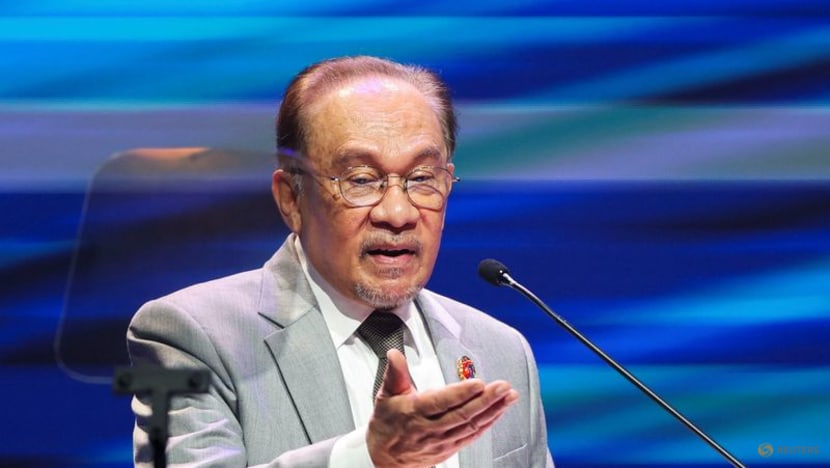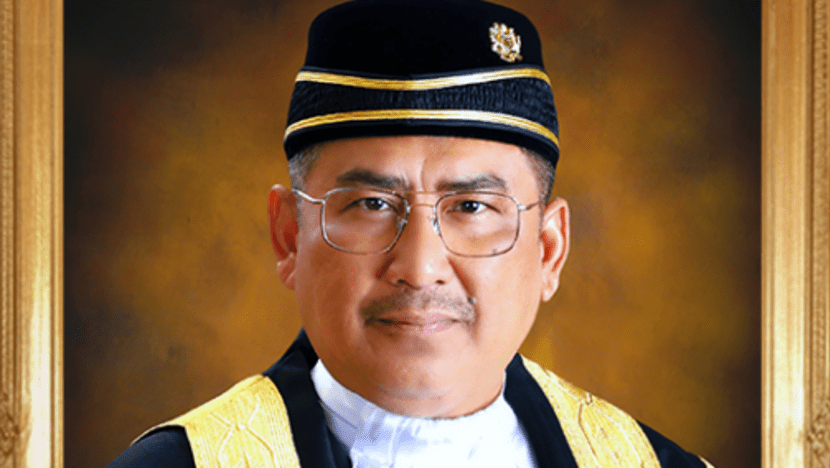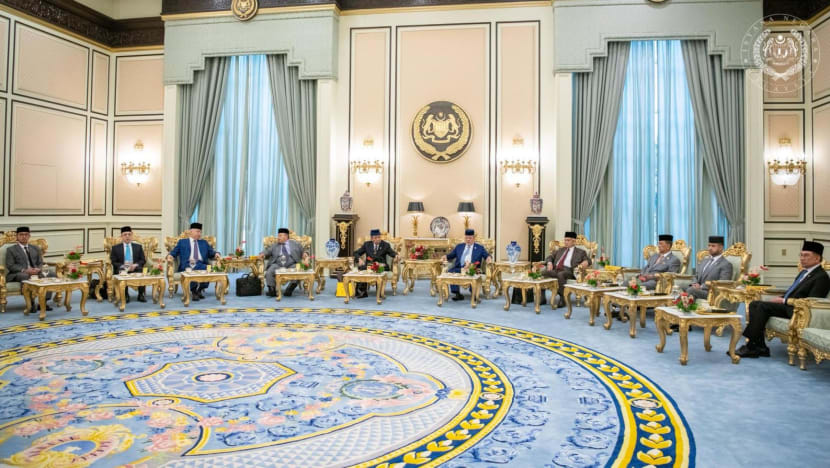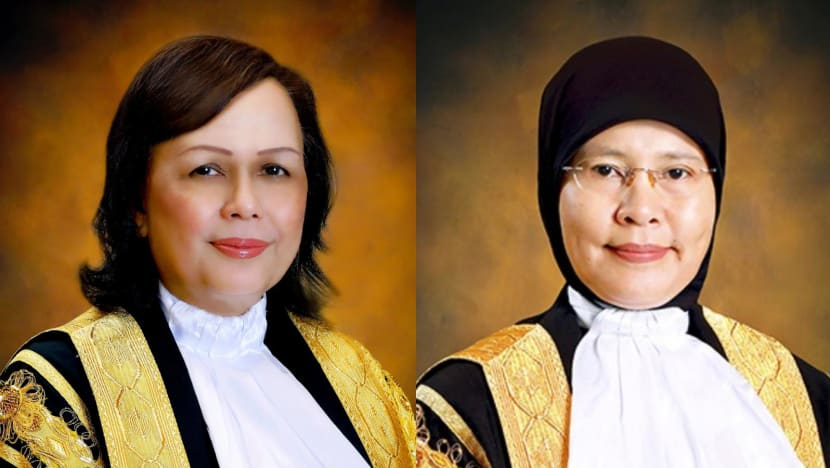analysis Asia
Malaysia’s royal rulers set to announce new top judges - how will it impact PM Anwar?
PM Anwar Ibrahim said on Tuesday (Jul 15) that he hopes the upcoming announcement by the Conference of Rulers, consisting the heads of the nine royal households, will help “dispel negative perceptions”.


This audio is generated by an AI tool.
KUALA LUMPUR: In a bid to ease political pressure over a crisis in the Malaysian judiciary, Prime Minister Anwar Ibrahim said on Tuesday (Jul 15) that the Conference of Rulers - Malaysia’s largely ceremonial heads of the nine royal households - will announce top judges’ appointments the next day.
Anwar also said that he hoped the announcement will help “dispel negative perceptions” on two issues that have been raised by lawyers, politicians and the public: A delay in the judiciary appointments and alleged political interference in the process.
“I can assure you that is not the case,” he said in his speech at the International Conference on Governance and Integrity 2025 in the capital Kuala Lumpur, as quoted by news outlet Malay Mail.
He reiterated that he has never spoken to any judges on any case. “I adhere to the principles of judicial independence.”
The three-day meeting of the Conference of Rulers, which began on Tuesday, is expected to finalise the appointment of the Chief Justice and President of the Court of Appeal that became vacant when Tengku Maimun Tuan Mat and Abang Iskandar Abang Ismail retired after reaching the age of 66 on Jul 2 and Jul 3 respectively.
Whether the announcement heads off an increasingly noisy public dust-up over the crisis surrounding the judiciary amid allegations of political interference in the judicial appointments, remains to be seen, lawyers told CNA.
The issue has become a magnet for controversy due to explosive allegations contained in what is believed to be a leak over the weekend of a confidential set of minutes from a Judicial Appointments Commission (JAC) meeting in mid-May.
JAC plays a central role in the nomination of jurists for high office and the allegations have cast a long cloud over Federal Court judge Ahmad Terrirudin Mohd Salleh, who is widely seen as a candidate highly favoured by Anwar to eventually take the top leadership role in the judiciary.
CENTRE OF THE POLITICAL STORM
Terrirudin, who served as the country’s Attorney General for 14 months before being appointed to the Federal Court in November 2024, is now at the centre of the political storm whipped up by the crisis in the judiciary.
The purported leaked JAC minutes alleged that his conduct as a judge raised serious questions about his suitability for high office in the judiciary.

Various politicians from both sides of the aisle, including Anwar’s own daughter Nurul Izzah Anwar, have called for a probe into the allegations, while the police are also probing the alleged leak.
All of this makes this week’s meeting of the Conference of Rulers a hugely important affair for national politics, political analysts and lawyers said.
Should Terrirudin emerge as a candidate to fill the vacancies in the judiciary leadership despite the cloud of controversy over him, it would mark a serious blow to Anwar’s already bruised stature as premier because of the slow pace of policy reforms that he promised before coming to office, lawyers and political analysts said.
There are also reputational risks for the country’s royalty, which has repeatedly been forced to play a direct role as peacemaker and final arbiter in Malaysia’s political crises, with four changes of government since 2018.
“Endorsing a judge faced with allegations that have yet to be set aside would send a very bad message,” said a partner of a large Malaysian law firm, who asked not to be named because of the sensitivities over comment on the royal households.
“Our judiciary is under siege,” said Wong Chen, a Member of Parliament (MP) and a senior member of Anwar’s own Parti Keadilan Rakyat (PKR), who is part of a group of increasingly disenchanted allies of the premier leading an internal rebellion over the mushrooming judicial crisis.

What began as a battle of wills between the Anwar government and certain segments of the judiciary has morphed into a full-blown constitutional crisis between both sides.
Tensions blew out into the open early last week when former Economy Minister Rafizi Ramli led eight other PKR MPs demanding an immediate parliamentary investigation and the formation of a Royal Commission of Inquiry over alleged political interference in the judiciary.
For much of last week, the Anwar government was viewed to have ignored the increasingly loud noises of protests that began to grow from the Bar Council - which represents lawyers in Malaysia, and other political parties on both sides of the divide - over his delay in filling the vacancies in the leadership of the judiciary.
Under laws governing the appointment of top judges, the nine-member JAC proposes qualified jurists to the prime minister, who makes a final decision based on the recommendations.
His decision is then put up for endorsement by heads of the country’s royal households who make up the Conference of Rulers.
The JAC is made up of judges as well as current and former members of the legal fraternity, and legal sources have told CNA that some in the JAC are aligned with the government while others are not.
BOMBSHELL
To mollify growing public criticisms over the vacancies, the Anwar government moved to make temporary appointments.
In a move that retired judges and lawyers noted was unprecedented in Malaysia’s judicial history, the judiciary’s third-most senior jurist, Hasnah Mohamed Hashim, who is the Chief Judge of Malaya, was appointed to assume the role of Chief Justice in an acting capacity until the position is filled.
In rapid succession, the Registrar of the Federal Court said that Federal Court judge Zabariah Yusof has been appointed acting President of the Court of Appeal until the position is filled permanently.
But these moves did not help quell the increasingly noisy public dust-up over the government’s alleged interference mainly because of speculation over a sharp divide among JAC members with regards to Terrirudin’s conduct as a judge and allegations of misconduct that were discussed during the mid-May meeting.
Then came an unexpected bombshell landing last Saturday, when purported screenshots of selected pages from the confidential minutes of the May 16 JAC meeting were anonymously dumped on social media platform Reddit before quickly spreading like wildfire on other sites popular among Malaysia’s hyper-active Internet community.
The leak has put the government on the defensive.
Information Minister Fahmi Fadzil stated that the alleged leaked JAC minutes could have legal implications, including breaches under the country’s Officials Secrets Act, if the authorities confirmed its authenticity.
Lawyers close to the situation told CNA that details contained in the alleged leaked documents offered an accurate construction of events that they have been receiving from other sources in the legal fraternity, including judges.
According to the lawyers, the JAC meeting on May 16, was among other things, convened to discuss the nomination for the position of the Chief Judge of the High Court of Malaysia.
There was already wide consensus in the legal fraternity that Hasnah and Zabariah would take over from Tengku Maimun and Abang Iskandar respectively, based on the typically applied considerations of seniority and merit.
The crucial vacancy to be filled was the Chief Judge for the High Court of Malaya, the third most senior position in the judiciary.
Zabariah turned 66 in April and following her six-month extension, she will retire in October. Hasnah, meanwhile, turned 66 on Tuesday and will retire later this year.

Lawyers and retired judges closely monitoring the developments in the judiciary said the prospect that two of the most senior positions in the judiciary would become vacant in the next six months made the position of the Chief Judge of Malaya hugely crucial in the leadership succession in the judiciary.
That’s because the candidate picked for the third most senior position in the judiciary would be in line for a top leadership role in the judiciary.
At the mid-May JAC meeting, which was attended by eight of the panel’s nine members, Tengku Maimun first nominated Federal Court judge Vazeer Alam Mydin Meera for the Chief Judge of Malaya because of his seniority.
But a contest for the position quickly emerged when Hasnah, who is also a member of the JAC, nominated Terrirudin as another candidate.
That, according to lawyers familiar with the situation, prompted Tengku Maimun to raise reservations over the nomination of Terrirudin. These were related to his conduct as a judge and also his alleged attempts to interfere in legal cases that were outside his purview, the lawyers said.
The meeting then went on to conduct a secret vote on the two candidates and the outcome was deadlocked with each candidate receiving four votes from the eight members of the JAC who were present.
Senior lawyers noted that in a deadlock situation, the presiding chairman of the JAC meeting would have the deciding vote.
In the case of the May 16 meeting, Tengku Maimun was chairman of the JAC but it is unclear whether she exercised that provision.
PKR’s Rafizi, who is leading a public campaign for greater transparency in judicial appointment, suggested at a hastily arranged public forum on Sunday that the Anwar government would likely appoint Hasnah and Zabariah to the top two positions, while Terrirudin would be endorsed to take over as the Chief Judge of Malaya.
“That is what I am speculating could happen. If it does, PH will pay dearly for this in the next election,” Rafizi said, referring to the Anwar-led Pakatan Harapan coalition.


















